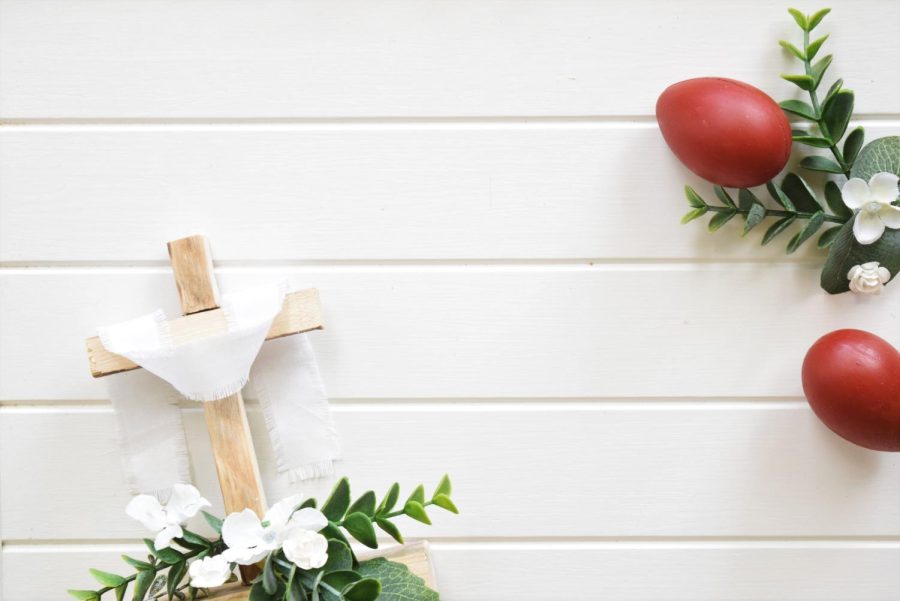Happy Orthodox Pascha
April 16, 2023
Orthodox Easter is a fest of Christianity that marks redemption, sacrifice and the resurrection of Jesus Christ. The most important message is that of peace, unity and solidarity.
The main antithesis between Catholic and Orthodox Easter is the different date. Catholics use the Gregorian calendar to determine the exact date of the year, while Orthodox Christians use the Julian calendar.
In Orthodoxy, before Easter Sunday, Great Lent precedes, a 40-day period of fasting which symbolizes self-control, purification and the sufferings of Jesus before being led to crucifixion on earth, and eventually to eternal immortality.
Easter for Orthodox Christians, or Pascha, a Greek term that means Passover, symbolizes the amaranthine Passover from earth to paradise, from death to life and the moral transition from sin to soul catharsis.
During the Great Lent, the faithful remove several ingredients from their diet, leading up to Holy Week where they eat only food which does not come from living organisms, such as oil, bread, vegetables, rice and certain seafood, according to the Greek Orthodox Archdiocese of America.
Great Lent also is considered the period where people redefine their devotion to God, turn to philanthropy by helping fellow humans in need and adapt a moral and decent behavior.
“Lent is my favorite season for two different reasons; first because I follow the customs of my home country, while leaving abroad, and secondly because it is an opportunity for personal detoxification and purification for our body and soul,” Athanasios Barakaris, a Greek bank manager who lives in Astoria, New York, said.
The Orthodox Church has some unique dietary traditions. On Holy Thursday, Greeks dye red eggs that symbolize the spilled blood of Christ during his crucifixion. On Easter Sunday, they crack the eggs’ shells as a sign of the resurrection.
On Holy Thursday night, Greek women and children go to their parish and decorate the
Epitaph with flowers. Roses, Hyacinths, lilacs and daisies, which are all fresh flowers from the countryside. Each color has a specific meaning thus the red symbolizes blood, the white symbolizes purity and the purple symbolizes mourning. The decoration of the Epitaph often looks like an art work with drawn crosses, angels and letters.
Holy Friday is the day of national mourning. People of the cities walk around their Epitaphs until they all meet at a predetermined central point. The church bells ring mournfully several times during the day. Jesus Christ has died at the calvary, saving humanity from its sins.
Holy Saturday marks the last day of Lent and also Jesus’ last day of death before his resurrection that happened in order to determine the salvation of humankind. Greeks prepare all day for this fest. Households are fragrant with the flavors of homemade food and the aromas of fresh flowers.
Before midnight, people start gathering in the courtyard of the church and wait for the bells to ring loudly for the miraculous event, Jesus Christ has risen. The light from the elaborate and handmade candles highlights the thousands of shadows of people heading to celebrate with their families and friends, while the sky is lit by countless fireworks.
The Holy Pascha starts with a liturgy at the church and then follows lunch with family. Roasted lamb is the main food on every table. According to Apostle John, Jesus sacrificed himself, in order to save humanity from its sins, and therefore he is described as the “Lamb of God.” Lamb thereupon symbolizes the sacrifice of Jesus Christ on earth.
Easter tsoureki also has a protagonist role on that day. It is a sweet bread which is used as a dessert for that day. It symbolizes anagenesis, as the flour rises and takes on a complete and final shape.
“Easter Sunday is a day for family and friends. We spend the whole day together, celebrating the miracle of the Lord,” Dimitris Stratis, a Greek chef who lives in Kalamata, Greece, said. “Every person has the right to make mistakes, but acknowledging and forgiving sins help us move forward with unity and wisdom.”
Orthodox Easter is full of hymns, prophecies and divine liturgies that still attract millions of believers worldwide. Nine-in-ten Greeks believe in God, a significant 92% of total population, per Pew Research Center.
“In Italy Easter is an important festive for all. We have religious parades, by carried Madonna’s statue, the mother of Jesus, around the city,” said Giada Rosadini, an entrepreneur from Rome, Italy. “I love our sweet bread in the shape of dove which symbolizes hope.”
For godly Orthodox Christians, the resurrection of Jesus is a strong testimony that good defeats evil, and lights dispels darkness. There’s also another moral lesson. During the harsh days, humanity must not lose hope and believe in the power of love and unity.






























Bryan Cori • Apr 16, 2023 at 12:07 pm
Very insightful. I learned some things that I didn’t know before. Extremely well-written.